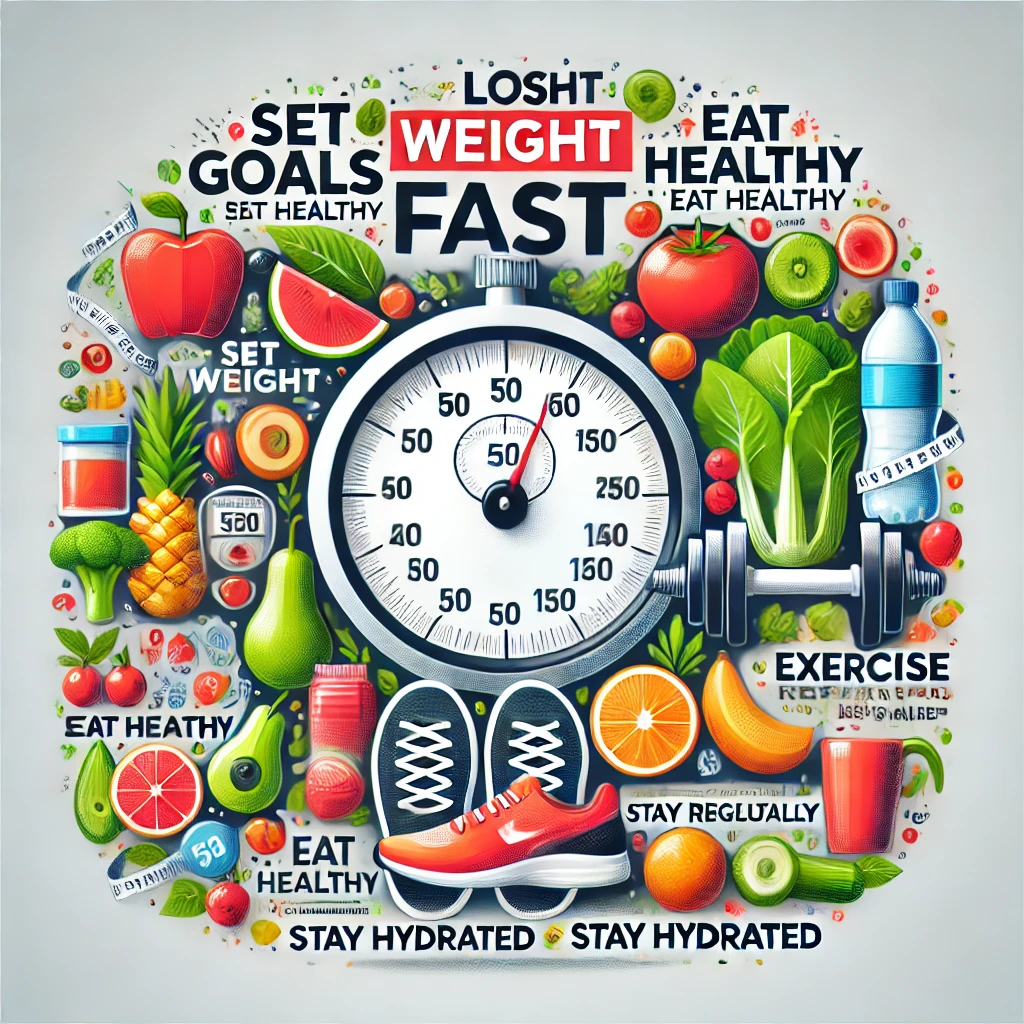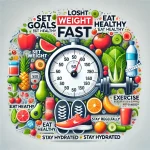
Table of Contents
Losing weight quickly is a goal for many, but it’s important to approach it in a healthy and sustainable way. Crash diets or extreme measures can lead to short-term results, but they often come at the cost of your long-term health. Here’s a comprehensive guide to losing weight fast while maintaining your overall well-being.
1. Set Clear and Realistic Goals
Before embarking on your weight loss journey, set clear and achievable goals. Aim to lose 1-2 pounds per week, as this is considered a healthy and sustainable rate of weight loss. Rapid weight loss can lead to muscle loss, nutritional deficiencies, and other health issues.
2. Prioritize a Balanced Diet
Diet is the most crucial factor in weight loss. Focus on creating a calorie deficit, meaning you consume fewer calories than your body burns. However, this doesn’t mean starving yourself. Instead, prioritize nutrient-dense foods that keep you full longer:
- Lean Proteins: Chicken, turkey, tofu, and fish can help build muscle and keep you satisfied.
- Fruits and Vegetables: These are low in calories but high in vitamins, minerals, and fiber.
- Whole Grains: Foods like quinoa, brown rice, and whole wheat bread provide sustained energy.
- Healthy Fats: Avocados, nuts, and olive oil are essential for overall health and help you feel full.
Avoid sugary snacks, processed foods, and beverages with empty calories like soda and alcohol.
3. Increase Physical Activity
Exercise plays a vital role in weight loss. Combine cardio exercises like running, cycling, or swimming with strength training to burn calories and build muscle. Muscle mass increases your resting metabolic rate, meaning you’ll burn more calories even when you’re not working out.
- Cardio: Aim for at least 150 minutes of moderate aerobic activity or 75 minutes of vigorous activity per week.
- Strength Training: Incorporate exercises like weight lifting, bodyweight exercises, or resistance bands at least two days a week.
High-Intensity Interval Training (HIIT) is also an effective way to burn calories in a short amount of time. This involves short bursts of intense activity followed by brief periods of rest.
4. Stay Hydrated
Drinking water is essential for weight loss. Sometimes, thirst is mistaken for hunger, leading to unnecessary snacking. Aim to drink at least 8-10 glasses of water a day. Water helps in digestion, reduces water retention, and boosts your metabolism.
- Tip: Drink a glass of water before meals to reduce appetite and prevent overeating.
5. Get Adequate Sleep
Sleep is often overlooked in weight loss plans, but it’s just as important as diet and exercise. Poor sleep disrupts the balance of hormones that regulate hunger, leading to increased appetite and cravings for unhealthy foods.
- Aim for: 7-9 hours of quality sleep per night. Establish a regular sleep routine, avoid screens before bed, and create a comfortable sleep environment.
6. Manage Stress
Stress can lead to emotional eating and weight gain. When stressed, the body produces cortisol, a hormone that can increase appetite and lead to fat storage, especially around the abdomen.
- Practice stress management techniques: Yoga, meditation, deep breathing exercises, and spending time in nature can help reduce stress.
7. Consider Intermittent Fasting
Intermittent fasting (IF) is a popular approach for quick weight loss. It involves alternating periods of eating and fasting. Common methods include the 16/8 method (fasting for 16 hours and eating during an 8-hour window) or the 5:2 method (eating normally for five days and restricting calories to 500-600 on two days). IF can help reduce calorie intake and improve metabolism, but it’s not suitable for everyone, so consult with a healthcare provider before starting.
8. Monitor Your Progress
Tracking your food intake, exercise, and weight can help you stay on course. Use a journal or an app to monitor your progress. This not only keeps you accountable but also helps you identify patterns and areas where you can improve.
9. Avoid Common Pitfalls
Be cautious of fad diets and weight loss supplements that promise rapid results. They often lead to yo-yo dieting, where you lose weight quickly only to regain it just as fast. Focus on making long-term lifestyle changes rather than seeking quick fixes.
10. Stay Consistent
Consistency is key in any weight loss journey. Make small, sustainable changes to your lifestyle that you can maintain over time. Weight loss is not just about reaching a specific number on the scale but about improving your overall health and well-being.

Conclusion
Losing weight fast is possible, but it should be approached with caution and a focus on overall health. By setting realistic goals, eating a balanced diet, staying active, and prioritizing sleep and stress management, you can achieve your weight loss goals in a healthy and sustainable way. Remember, the journey to a healthier you is a marathon, not a sprint.
How to Improve Your Sleep(8 Steps) – love a happy home (loveahh.com)










